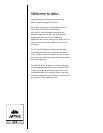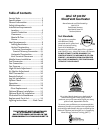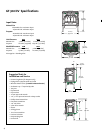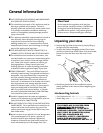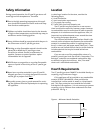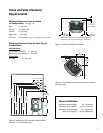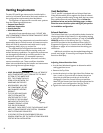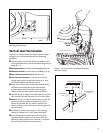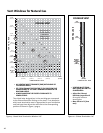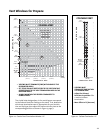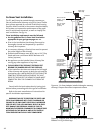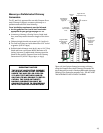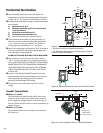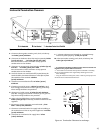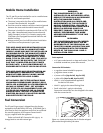
9
Vertical Vent Termination
The Jøtul GF 300 DV can be vertically vented through a
ceiling or to a roof termination with the following
guidelines:
The termination should fall within the shaded areas
of the grids depicted in the Vent Window diagrams on
pages 10 - 11.
Maximum Vertical run should not exceed 35 ft. (10.66 m).
Minimum Vertical run must be at least 8 ft. (2.43 m).
Max. Colinear Horizontal run is 2 ft. (61 cm).
Vent Terminus Clearance: In no case shall any dis-
charge opening on the cap be less than 18 in. (610
mm) horizontally from the roof surface.
Steep roofs, nearby trees, and predominantly windy
conditions can contribute to poor draft and/or
promote down-draft occurances. Increasing the
height of the vent may alleviate these conditions.
Use Wall Straps to support an offset pipe run at three
feet intervals to avoid excessive stress on the offsets.
Elbows: Four 45°, or two 90° elbows may be used. Do
not include the 45° elbow attached to the stove.
Whenever possible use 45° elbows instead of 90°
elbows as they are less restrictive to exhaust gas and
intake air flow.
A firestop is required at every floor. The opening
should be framed to 10" X 10" inside dimension.
Any venting that is exposed above the first floor,
regardless of attic space or living space, must be
enclosed. Always maintain the required 1" clearance
from all sides of the vertical vent system.
Figure 7. Use a nut driver to change the Exhaust
Restrictor setting.
Figure 6. Exhaust restrictor positions - viewed from front
with top plate removed.
Figure 8. Vertical vent termination height above roof.
A
C
D
B
See Fig. 6
Detail
Horizontal Overhang
Vertical W
all
Termination
Cap
18.
min.
Lowest Discharge
Opening
18 min.
18.
min.




